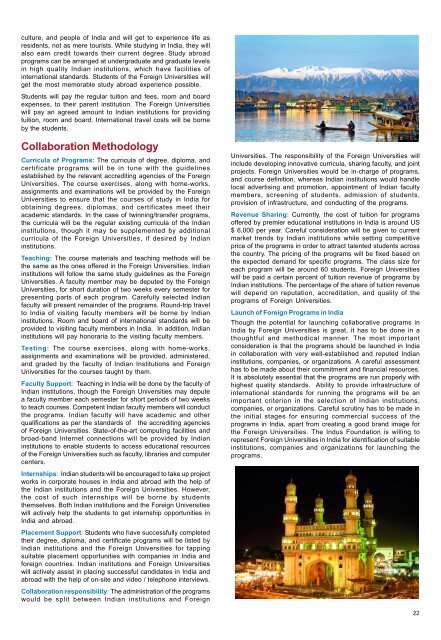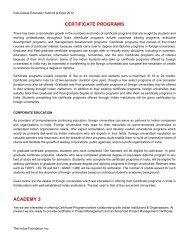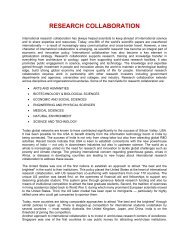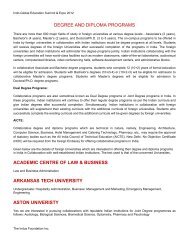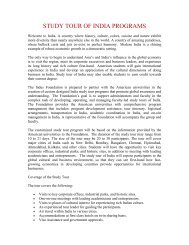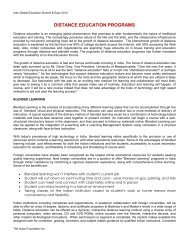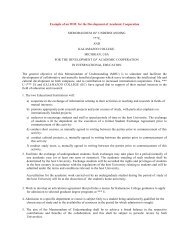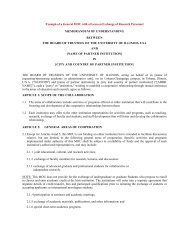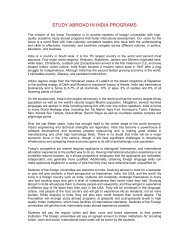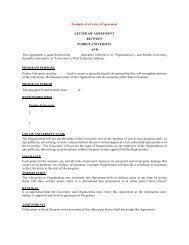Indo-Global Education Summit 2013 - The Indus Foundation
Indo-Global Education Summit 2013 - The Indus Foundation
Indo-Global Education Summit 2013 - The Indus Foundation
Create successful ePaper yourself
Turn your PDF publications into a flip-book with our unique Google optimized e-Paper software.
culture, and people of India and will get to experience life as<br />
residents, not as mere tourists. While studying in India, they will<br />
also earn credit towards their current degree. Study abroad<br />
programs can be arranged at undergraduate and graduate levels<br />
in high quality Indian institutions, which have facilities of<br />
international standards. Students of the Foreign Universities will<br />
get the most memorable study abroad experience possible.<br />
Students will pay the regular tuition and fees, room and board<br />
expenses, to their parent institution. <strong>The</strong> Foreign Universities<br />
will pay an agreed amount to Indian institutions for providing<br />
tuition, room and board. International travel costs will be borne<br />
by the students.<br />
Collaboration Methodology<br />
Curricula of Programs: <strong>The</strong> curricula of degree, diploma, and<br />
certificate programs will be in tune with the guidelines<br />
established by the relevant accrediting agencies of the Foreign<br />
Universities. <strong>The</strong> course exercises, along with home-works,<br />
assignments and examinations will be provided by the Foreign<br />
Universities to ensure that the courses of study in India for<br />
obtaining degrees, diplomas, and certificates meet their<br />
academic standards. In the case of twinning/transfer programs,<br />
the curricula will be the regular existing curricula of the Indian<br />
institutions, though it may be supplemented by additional<br />
curricula of the Foreign Universities, if desired by Indian<br />
institutions.<br />
Teaching: <strong>The</strong> course materials and teaching methods will be<br />
the same as the ones offered in the Foreign Universities. Indian<br />
institutions will follow the same study guidelines as the Foreign<br />
Universities. A faculty member may be deputed by the Foreign<br />
Universities, for short duration of two weeks every semester for<br />
presenting parts of each program. Carefully selected Indian<br />
faculty will present remainder of the programs. Round-trip travel<br />
to India of visiting faculty members will be borne by Indian<br />
institutions. Room and board of international standards will be<br />
provided to visiting faculty members in India. In addition, Indian<br />
institutions will pay honoraria to the visiting faculty members.<br />
Testing: <strong>The</strong> course exercises, along with home-works,<br />
assignments and examinations will be provided, administered,<br />
and graded by the faculty of Indian Institutions and Foreign<br />
Universities for the courses taught by them.<br />
Faculty Support: Teaching in India will be done by the faculty of<br />
Indian institutions, though the Foreign Universities may depute<br />
a faculty member each semester for short periods of two weeks<br />
to teach courses. Competent Indian faculty members will conduct<br />
the programs. Indian faculty will have academic and other<br />
qualifications as per the standards of the accrediting agencies<br />
of Foreign Universities. State-of-the-art computing facilities and<br />
broad-band Internet connections will be provided by Indian<br />
institutions to enable students to access educational resources<br />
of the Foreign Universities such as faculty, libraries and computer<br />
centers.<br />
Internships: Indian students will be encouraged to take up project<br />
works in corporate houses in India and abroad with the help of<br />
the Indian institutions and the Foreign Universities. However,<br />
the cost of such internships will be borne by students<br />
themselves. Both Indian institutions and the Foreign Universities<br />
will actively help the students to get internship opportunities in<br />
India and abroad.<br />
Placement Support: Students who have successfully completed<br />
their degree, diploma, and certificate programs will be listed by<br />
Indian institutions and the Foreign Universities for tapping<br />
suitable placement opportunities with companies in India and<br />
foreign countries. Indian institutions and Foreign Universities<br />
will actively assist in placing successful candidates in India and<br />
abroad with the help of on-site and video / telephone interviews.<br />
Collaboration responsibility: <strong>The</strong> administration of the programs<br />
would be split between Indian institutions and Foreign<br />
Universities. <strong>The</strong> responsibility of the Foreign Universities will<br />
include developing innovative curricula, sharing faculty, and joint<br />
projects. Foreign Universities would be in-charge of programs,<br />
and course definition, whereas Indian institutions would handle<br />
local advertising and promotion, appointment of Indian faculty<br />
members, screening of students, admission of students,<br />
provision of infrastructure, and conducting of the programs.<br />
Revenue Sharing: Currently, the cost of tuition for programs<br />
offered by premier educational institutions in India is around US<br />
$ 6,000 per year. Careful consideration will be given to current<br />
market trends by Indian institutions while setting competitive<br />
price of the programs in order to attract talented students across<br />
the country. <strong>The</strong> pricing of the programs will be fixed based on<br />
the expected demand for specific programs. <strong>The</strong> class size for<br />
each program will be around 60 students. Foreign Universities<br />
will be paid a certain percent of tuition revenue of programs by<br />
Indian institutions. <strong>The</strong> percentage of the share of tuition revenue<br />
will depend on reputation, accreditation, and quality of the<br />
programs of Foreign Universities.<br />
Launch of Foreign Programs in India<br />
Though the potential for launching collaborative programs in<br />
India by Foreign Universities is great, it has to be done in a<br />
thoughtful and methodical manner. <strong>The</strong> most important<br />
consideration is that the programs should be launched in India<br />
in collaboration with very well-established and reputed Indian<br />
institutions, companies, or organizations. A careful assessment<br />
has to be made about their commitment and financial resources.<br />
It is absolutely essential that the programs are run properly with<br />
highest quality standards. Ability to provide infrastructure of<br />
international standards for running the programs will be an<br />
important criterion in the selection of Indian institutions,<br />
companies, or organizations. Careful scrutiny has to be made in<br />
the initial stages for ensuring commercial success of the<br />
programs in India, apart from creating a good brand image for<br />
the Foreign Universities. <strong>The</strong> <strong>Indus</strong> <strong>Foundation</strong> is willing to<br />
represent Foreign Universities in India for identification of suitable<br />
institutions, companies and organizations for launching the<br />
programs.<br />
22


